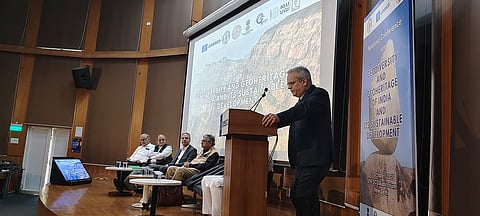

Experts have highlighted the importance of legal provisions and effective conservation programs to conserve India’s geo-heritage at a conference in the national capital.
More than 100 experts, researchers and policy makers from across the country participated in the two-day conference organised under the joint aegis of the Society of Earth Scientists, UNESCO and IIT Kanpur.
The event, held at the UNESCO House auditorium in New Delhi, was organised around the theme of “Geodiversity and Geoheritage of India: Its Sustainable Development”.
The meeting highlighted the vital role of geo-diversity for national prosperity and environmental sustainability. Chief guests included UNESCO Director Tim Curtis, Amit Dharwadkar, deputy director general of the Geological Survey of India, and Alireza Amirkazemi of the UNESCO Global Geoparks Programme.
“Geo-heritage created over millions of years once destroyed, cannot be restored. There are 229 Global Geoparks worldwide to preserve such heritage, and there is potential for one in India as well,” Asier Hilario, president of the Geoheritage Commission of the International Union of Geological Sciences (IUGS), said in his video message at the conference.
In his address, Amirkazemi stressed on the need for institutional framework and involvement of local communities to promote sustainable geo-tourism in India.
Kristof Vanderberghe (Head, UNESCO Global Geoparks Programme), a speaker who joined online from UNESCO Headquarters in Paris, explained that community-based initiatives, site-listing, local partnerships, sustainable management plans and phased processes are essential for an area to be recognised as a UNESCO Global Geopark.
“The preservation of land records not only strengthens education and disaster preparedness, but also reinforces cultural identity,” Hilario said.
Amirkazemi outlined the essential elements for a successful geopark, such as interpretation centres, visitor management, community training and long-term monitoring systems.
In the discussion session, Benno Boer said, “Despite having such a rich geo-heritage, India still does not have a single UNESCO Global Geopark. This situation must change.” He called on India’s scientific community to work collectively to achieve UNESCO Global Geopark status.
The organisers described the event as an “awakening of geoscience,” marking an important step towards integrating India’s geo-conservation efforts with UNESCO’s sustainable development framework.
Conference coordinator Satish Tripathi stated that concrete action on the ground is essential for establishing geoparks.
Experts jointly emphasised the need for research collaboration, policy reform, and community-based conservation to preserve and enhance India’s unique geo-heritage.